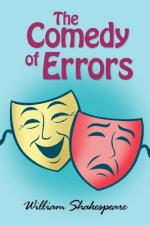|
This section contains 6,994 words (approx. 24 pages at 300 words per page) |

|
SOURCE: “The Significance of Shakespeare's ‘Classical’ Comedy,” in Shakespeare, Plautus and the Humanist Tradition, D. S. Brewster, 1990, pp. 198-211.
In the essay that follows, Riehle argues that The Comedy of Errors reflects a classically “pagan” orientation, in which the fantastical elements enhance rather than hinder the coherence and intensity of the drama.
Errors is a play in which a number of themes that were to become increasingly important in Shakespeare's work are dramatized. Very early in the play, the ‘cosmic order’, the ‘cosmic reality behind appearance’1 is envisaged, and the contrast between appearance and reality becomes fundamental. H. F. Brooks has rightly maintained that ‘At the centre is relationship: relationship between human beings, depending on their right relationship to truth and universal law.’2 The necessity of justice as well as of mercy is emphasized. All this, except for the theme of cosmic order, is fully in line with...
|
This section contains 6,994 words (approx. 24 pages at 300 words per page) |

|


